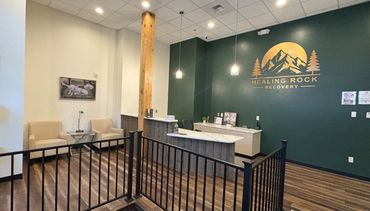
Cognitive Behavioral Therapy (CBT) for Addiction in Montana
Find Cognitive Behavioral Therapy (CBT) treatment for addiction in Montana. CBT helps treat addiction by identifying triggers, changing harmful thought patterns, building coping skills, and preventing relapse through improved self-awareness and decision-making. Find CBT treatment centers in Montana today!
Treatment Centers in Montana
Open to Travel? Check out Top-Rated Options
All Treatment Centers in Montana
Are You Covered For Treatment?
- Billings Rehabs
- Helena Rehabs
- Missoula Rehabs
- Great Falls Rehabs
- Kalispell Rehabs
- Butte Rehabs
- Sidney Rehabs
- Havre Rehabs
- Bozeman Rehabs
- Lewistown Rehabs
Rehab Insurance Coverage in Montana
Rehab Centers in Montana
Information About Rehab in Montana
Latest Reviews
Latest Reviews of Rehabs in Montana
Misfits LLC
Outpatient addiction services. Julie is a wonderful counselor and teachs you how to build meaningful connections in order to build yourself a support system to stay in recovery. Always welcoming no matter how many times you leave.
Rocky Mountain Treatment Center
They helped me hang on o me humanity, and helped me expand myself, also gave me mental tools to fall back on. I would say this play helps you feel self worth afain, and helps you decide to say of drugs.
Crystal Creek Lodge Treatment Center
I just got out of Chrystal creek lodge today. I think they did a great job.
About Montana
Montana, also known as “The Treasure State,” is a captivating and diverse part of the western United States. With a population of approximately 1.1 million people,1 Montana offers a unique blend of natural beauty, rugged landscapes, and rich cultural heritage. Its geography is characterized by picturesque mountains, including the iconic Rocky Mountains and the breathtaking Glacier National Park. Vast prairies, sparkling lakes, and winding rivers contribute to Montana’s scenic allure.
The state is renowned for its outdoor recreational activities such as hiking, fishing, skiing, and wildlife observation. The people of Montana take pride in their independent spirit, close-knit communities, and a strong connection to the land. The state’s cultural fabric is influenced by Native American traditions, Western cowboy culture, and the preservation of its mining and ranching heritage. Montanans value their natural resources and are committed to environmental conservation. This combination of stunning landscapes, resilient communities, and a distinct cultural identity makes Montana a truly remarkable place to live or visit.
Addiction in Montana
Montana has seen its share of challenges in dealing with substance abuse and its consequences. According to a report published by the Substance Abuse and Mental Health Services Administration, the annual average prevalence of past-year substance use disorder from 2017-2019 in the state was 10.1%, which translates to approximately 90,000 people.2 This figure is notably higher than the national average of 7.4%.2
Despite its smaller population compared to other states, Montana is not exempt from the pervasive issue of substance misuse and addiction that plagues the rest of the United States. Between 2007 and 2018, drug overdoses have emerged as the fourth leading cause of injury-related deaths in Montana, resulting in a staggering 1,437 fatalities.3
Addiction Treatment in Montana
In Montana, individuals seeking addiction treatment have access to various levels of care to meet their specific needs. These levels of treatment include detoxification, inpatient rehabilitation, and outpatient programs.
- Detox: Detoxification (detox) is the initial stage of treatment, focusing on safely managing withdrawal symptoms and helping individuals become physically stable. It involves medical supervision and support to address the immediate effects of substance withdrawal.
- Inpatient Treatment: Inpatient treatment, also known as residential treatment, offers a more intensive and structured approach to treatment. It involves residing at a treatment facility for a designated period, typically ranging from 28 days to several months. Inpatient programs provide a supportive and immersive environment where individuals receive round-the-clock care, counseling, therapy, and various evidence-based treatments tailored to their needs.
- Outpatient Treatment: Outpatient programs allow individuals to live at home while attending treatment sessions. These programs offer flexibility for those with work or family commitments. Outpatient treatment typically includes counseling, therapy, education, and support groups to help individuals maintain sobriety while still being able to fulfill their daily responsibilities.
Montana’s addiction treatment facilities also offer a range of therapies and specialized programs to address specific needs. These may include cognitive-behavioral therapy (CBT), individual and group counseling, family therapy, LGBTQ+ programs, and dual diagnosis treatment for co-occurring mental health disorders, among others.
In addition, Montana provides options for luxury rehabs, which offer upscale amenities and a higher level of comfort during treatment. These facilities often provide a serene and luxurious environment while delivering comprehensive addiction care. Private rehabs are another option, where individuals can access treatment through private insurance or self-payment. These facilities may offer personalized treatment plans, a range of therapy modalities, and additional services to cater to individual preferences and needs.
To find a drug and alcohol rehab in Montana, individuals can utilize resources such as our search tool, which helps locate nearby treatment facilities. This tool provides a convenient way to identify and explore available options and contact local rehab centers for further information and assistance in selecting the most suitable treatment program.
How Much Does Rehab Cost?
Most insurance plans, including private insurance and employer-provided plans, offer at least partial coverage for addiction treatment services. This coverage may include detoxification, inpatient rehabilitation, outpatient programs, and various therapeutic interventions. To use insurance for addiction treatment, individuals are encouraged to contact their insurance provider directly. By reaching out, they can inquire about their specific coverage details, including any deductibles, co-pays, or limitations they can expect.
For those who are uninsured or unable to access private insurance, there is an option to seek treatment at a state-funded treatment center. State-funded centers are facilities that receive financial support from the government to provide addiction treatment services to individuals who may not have insurance or the means to pay for private treatment. These centers offer a range of services, including detoxification, counseling, therapy, and support groups, with the goal of assisting individuals on their path to recovery.
In-Network Insurance Options
Length of Stay in Rehab
When it comes to addiction treatment in Montana, there are different options for the length of stay depending on individual needs and the severity of the addiction. The most common durations for treatment programs include 30-day, 60-day, and 90-day stays.
In addition to these standard program lengths, there is also an option for long-term rehab. Long-term rehab is typically designed for individuals with severe addiction or those who require an extended period of structured treatment. These programs can last anywhere from six months to two years, depending on the individual’s treatment needs and the specific facility/program enrolled in.
Recovery Starts Today
Finding the right addiction treatment in Montana is crucial for achieving lifelong recovery. With the variety of options available, it’s essential to find a treatment program that meets your specific needs and provides the necessary support for sustained recovery. By taking the time to research and choose the right treatment program, individuals can set themselves up for success in their recovery journey. Remember, recovery is possible, and seeking the right treatment can be the first step towards a healthier and more fulfilling life.
Sources:
- United States Census Bureau. QuickFacts-Montana. July 1, 2022.
- Substance Abuse and Mental Health Services Administration. Behavioral Health Barometer: Montana, Volume 6.
- Montana Department of Public Health and Human Services. Montana Substance Use Disorder Task Force Strategic Plan.















